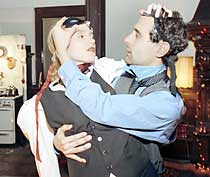For its debut production at its new space
in the Brooklyn Public Library’s Pacific Street Branch, the Ritual
Theatre Company has chosen to mount August Strindberg’s "Miss
Julie."
The choice is excellent, given the nature of the company and
the talents of its actors.
Founded in Chicago in 1996 by Robert Kropf, the Ritual Theatre
Company was reincarnated in Brooklyn after Kropf, a Park Slope
resident, met fellow-Sloper Winona Sorensen last May at the Wellfleet
Harbor Actor’s Theatre. Their Brooklyn location was made possible
by a partnership with the Brooklyn Public Library: in exchange
for after-school theater classes for young adults, the library
provides the company with rehearsal and performance space at
its Pacific Street Branch.
Ritual Theater Company describes itself as "an actor-driven
collaborative ensemble dedicated to the celebration of great
texts." Which makes Strindberg’s classic drama about a passionate
countess, and her doomed attraction to her father’s valet, an
obvious choice for launching RTC’s residence in Brooklyn.
In 1892, when "Miss Julie" was first produced, it caused
quite a stir. The play, with its themes of gender and class conflict,
had, in fact, already been banned in Denmark when it was finally
accepted by the avant-garde little theater of Berlin, Die Freie
Buhne.
"Miss Julie" was notable (or notorious) for what was
then considered its lewd material, and it also commanded attention
for technical reasons. Strindberg was a strong advocate of naturalistic
drama based on social Darwinism and Friedrich Nietzsche’s "will-to-power"
philosophy. His characters are motivated by psychological needs,
often repressed, and their actions flow naturally from the psychological
drama. Thus Strindberg advocated the abolition of intermissions
and act division, and "Miss Julie" runs for over an
hour of unremitting conflict.
Today, however, "Miss Julie" seems neither technically
nor thematically radical, and the play is more often cited as
an influence on playwrights such as Eugene O’Neill and Tennessee
Williams than actually performed. Yet Strindberg’s poetic language
and personal insights remain compelling even when his psychological
theories seem dated.
True to Strindberg’s script, RTC has set "Miss Julie"
in the count’s kitchen on Midsummer Night’s Eve, although they
have paid scant attention to the playwright’s detailed scenic
design. The actors, who have also worked on the set, claim to
have found all the scenic elements, down to an ancient gas stove,
on the streets of Park Slope, and the turn-of-the-century clothing
in thrift shops.
The actors dutifully follow Strindberg’s most tortuous dialogue
– his long monologues, his ornate prose – and do a magnificent
job at that.
Valerie Stanford, a statuesque blonde beauty, arouses both pity
and scorn as the man-hating servant-seducing "Miss Julie."
She is passionate, haughty, wonton and, in the end, quite vulnerable.
Kropf as Jean, the valet, and Sorensen as Kristen, the cook whom
he intends to marry some day, are priggish and self-righteous.
They know their place, even if their "betters" don’t.
The difference is that Kristen, although willing to enjoy stolen
wine and take small kick-backs, is genuinely respectful of the
aristocracy and disappointed in their fall from grace, while
Jean is happy to learn his "betters" are at bottom
no better than anyone else.
"Miss Julie" is not only a battle between men and women,
and the aristocracy and their servants; it is also a battle of
wits. Is it Julie who seduces Jean or the opposite? Whatever
has inspired the brutish Jean to such flights of poetry? Does
anyone win in the end, or have they all lost something: self-respect,
innocence, a sense of order in their world? The actors bring
these conflicts vividly, sometimes painfully, to life.
At a time when the division between classes seems to have become
fuzzy, when football stars, politicians and movie stars are equally
admired and reviled, when British royalty cavorts like hormone-driven
adolescents, when women are lawyers and husbands become stay-at-home
dads, it’s easy to see "Miss Julie" as a relic of the
past.
Yet it’s instructive to note that at 30, Roe v. Wade seems in
grave danger, that women often do not get equal pay for equal
work, that most often the poor do indeed stay poor and the gap
between the rich and the poor is steadily growing in 21st century
America.
"Miss Julie" is a welcome reminder of how far society
has come since the late 19th century, and how far we have yet
to go. The Ritual Theatre Company should be commended for letting
us forget neither the play nor the issues it brings to light.
Ring of truth
In 1937, when Clifford Odets’ "Golden Boy" was first
produced by The Group Theater, the American people were in the
midst of the Great Depression and on the brink of entering World
War II. The parallels with present-day America are unmistakable.
That may be one reason The Impact Theatre chose to stage this
play. Or they may have been drawn by Odets’ powerful language
and unforgettable characters. Either way, director Ron Parrella
has staged a hit.
"Golden Boy" reflects Odets’ personal battle with the
temptations of profit and the ideals of social justice and art.
(Odets ended up in Hollywood.)
Joe Bonaparte (Mikal Saint George) is an Italian-American youth
whose father (Bob Melia) is grooming him to become a violinist.
But Joe, eager to make his mark in the world and escape the poverty
in which his family lives, instead turns to manager Tom Moody
(Tim Lewis), who promises to make him into a champion prize fighter.
While Joe keeps winning more and more fights, he also wins the
heart of Moody’s mistress, Lorna Moon (Joan Ryan). But his father
never gives up his dream.
Saint George is tender and tough in the title role. He makes
up for his lack of girth with his hard-nosed defiance. And Parrella
has wisely kept him covered up so no one notices too much that
he doesn’t look like he could K.O. a 10-year-old.
Ryan has blond hair and innocent blue eyes. But she definitely
is not the girl-next-door. She’s a smart-alecky but sensitive
broad who delivers lines like "When I came out of the cocoon
I was a butterfly. And butterflies don’t work," but also
complains that unless Moody divorces his wife to marry her, she
will continue to feel like the "Tramp from Newark."
Lewis, who as head of The Impact Theatre appears on stage infrequently,
proves to be a dynamo on stage. His textured performance creates
a Moody who can threaten, cajole, cry and cringe.
Odets has populated his play with choice parts for gifted character
actors – Carp (Michael Maher) the armchair philosopher and radical;
Roxy Gottlieb (Ed Ferruzza) the sleazy cigar-smoking promoter;
and Siggie (Tom Clemons), Joe’s whining brother-in-law. And the
cast in the Impact Theatre production acquits itself admirably
in the supporting roles.
This is a spare production – in fact, a bit too spare. One would
have liked to see more than a few chairs and a desk as scenery.
True, The Impact Theatre does have limited space, but surely
a few photos of champion boxers could have been put on the walls
and perhaps a trophy or two adorned the shelves in the office
of a manager of prize fighters?
Nevertheless Odets’ evocative language creates its own landscape
with lines like "A woman’s place is in the hay, not in the
office" and "I’ll make Niagara Falls turn around and
go back to Canada."
"Golden Boy" has had an interesting history. It ran
for 250 performances when it was staged by The Group Theatre
under the direction of Harold Clurman, with Luther Adler as Joe
Bonaparte, Morris Carnovsky as his father and Frances Farmer
as Lorna. It not only revived the company financially, it also
turned out to be the Group’s biggest moneymaker.
In 1939, "Golden Boy" was turned into a film directed
by Rouben Mamoulian with a stellar cast that included Barbara
Stanwyck (Lorna Moon), Adolphe Menjou (Tom Moody), Lee J. Cobb
(Joe’s father) and the unknown 21-year-old William Holden in
the role of Joe Bonaparte.
The play was revived in 1952 and again in 1975. And in 1964,
"Golden Boy" was transformed by Odets and William Gibson
into a musical with lyrics by Lee Adams and music by Charles
Strouse, and Sammy Davis Jr. in the lead role.
With all the talent on stage in this production, one can only
hope "Golden Boy" will continue its series of successes
for The Impact Theatre.
The Ritual Theatre Company’s production
of "Miss Julie" plays through Feb. 1, Wednesdays through
Saturdays at 8 pm, at the Brooklyn Public Library’s Pacific Street
Branch, 25 Fourth Ave. on the corner of Pacific Street in Boerum
Hill. Suggested donation $15. For reservations, call (212) 946-5613
or e-mail ritualtheatre@yahoo.com. For more information, visit
www.ritualtheatre.org.
"Golden Boy" plays through Feb. 2, Thursday through
Saturday at 8 pm and Sunday at 3 pm at The Impact Theatre, 190
Underhill Ave. between Sterling Place and St. Johns Place in
Prospect Heights. Tickets are $15. For reservations, call (718)
390-7163.

























